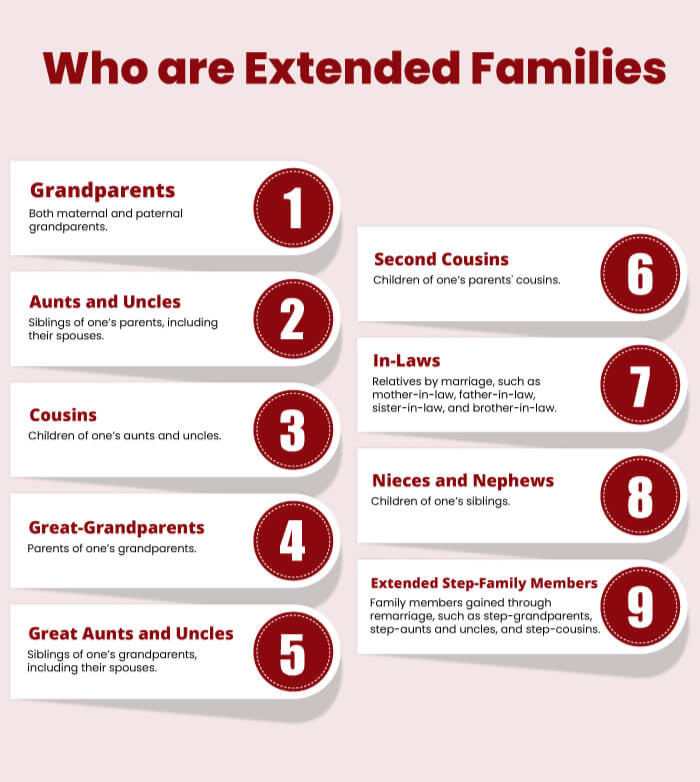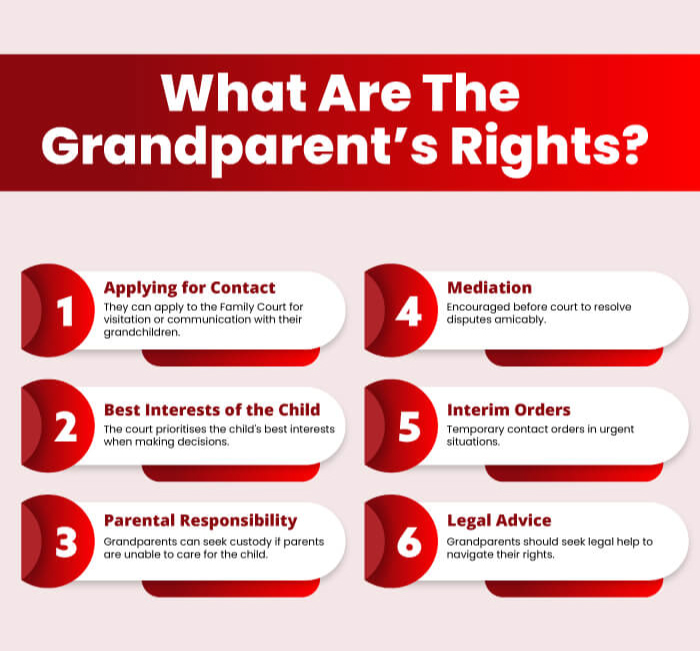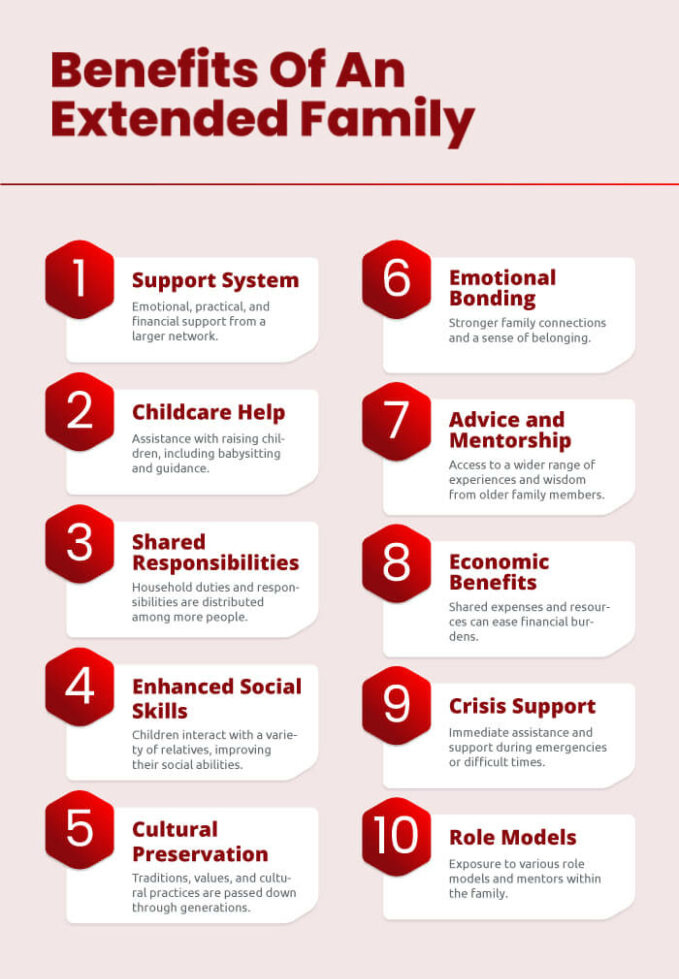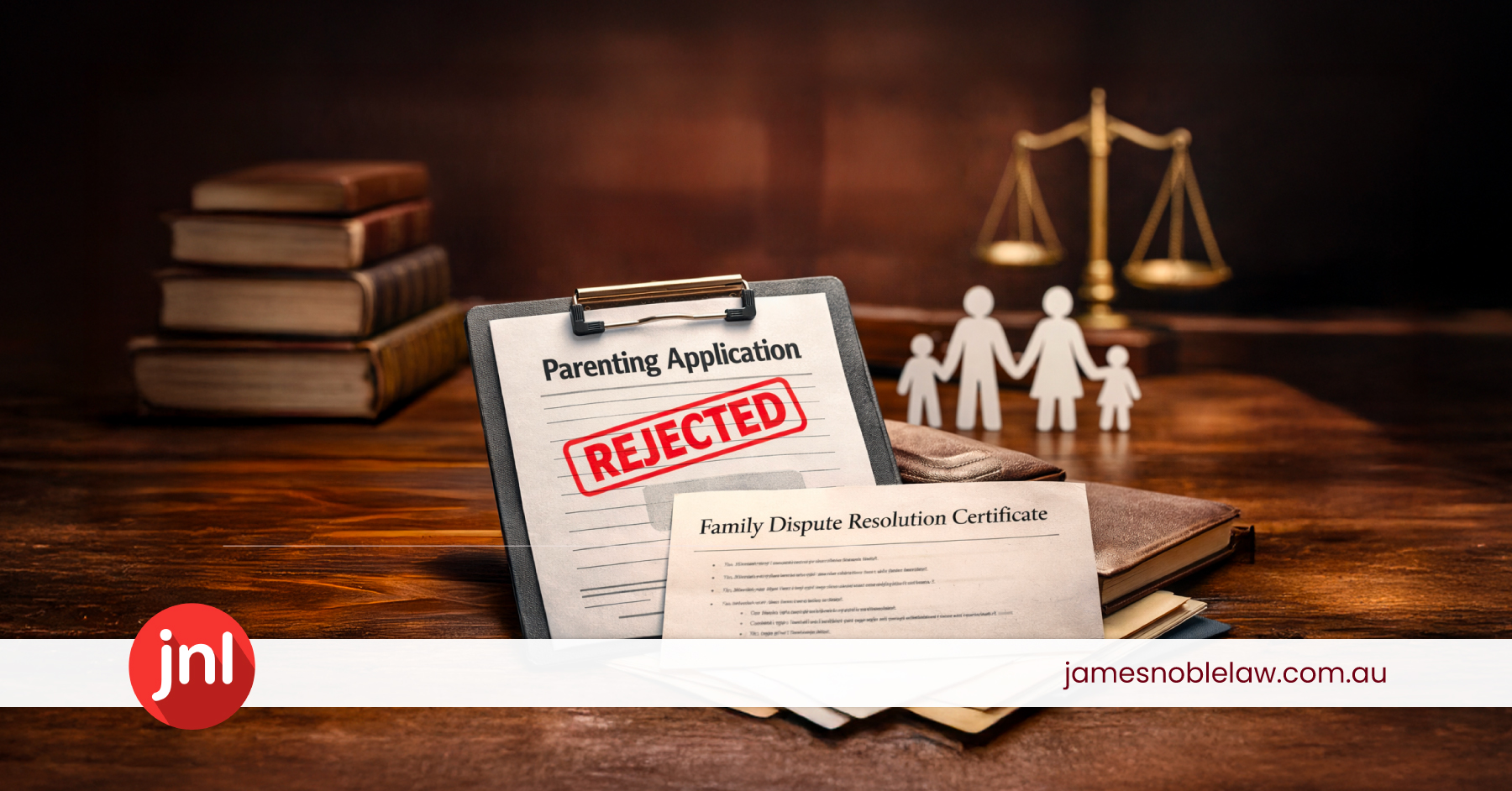Understanding the Court’s Power and How to Protect Yourself One of the most common assumptions in family law is that everyone pays their own legal costs.…

Navigating Grandparents’ Legal Rights and Rights of Extended Family Members in Family Law Matters: A Guide to Visitation and Custody Matters

The bond between grandparents and their grandchildren is often a source of love, support, and continuity within a family.
However, there are instances when grandparents find themselves facing challenges in maintaining this connection, especially during divorce or separation proceedings.
Understanding the legal rights of grandparents in visitation and custody cases is crucial for ensuring the well-being of both grandparents and grandchildren.
Visitation Rights for Grandparents. Grandparents applying for Orders to spend time with their grandchildren
Grandparents may seek visitation rights if their access to their grandchildren is limited or denied. The Family Law Act 1975 in Australia recognises the importance of maintaining a child’s meaningful relationships with their grandparents and allows grandparents to apply for a court order to spend time with their grandchildren.
The court will consider the best interests of the child as the paramount factor in making such decisions. Grandparents must demonstrate that maintaining a relationship with them is in the child’s best interest. Factors such as the existing relationship between the grandparent and grandchild, the child’s wishes (if they are of a mature age), and the capacity of the grandparent to provide a stable and supportive environment will be taken into account.
Custody Rights for Grandparents or Grandparents applying for a ‘live with’ Order.
While it is generally more challenging for grandparents to obtain custody rights, it is not impossible. In cases where parents are deemed unfit or unable to care for their children, the court may consider granting custody to grandparents if it is in the best interests of the child. Grandparents must be prepared to provide evidence that the parents are unfit and that living with them would be detrimental to the child’s well-being.
Legal Process for Grandparents
To assert their legal rights, grandparents must follow the appropriate legal process. This typically involves filing an application with the Family Court of Australia. It’s advisable for grandparents to seek legal advice and, if possible, engage the services of a family lawyer who specialises in child custody and visitation cases.
Mediation and Alternative Dispute Resolution
Before resorting to court proceedings, the court may require grandparents to participate in mediation or alternative dispute resolution processes. These mechanisms aim to help parties reach an agreement outside of court, reducing the emotional and financial burden on the family. A trained mediator can facilitate discussions between grandparents and parents, focusing on the best interests of the child.
Grandparents have legal avenues to pursue visitation and custody rights. Navigating these processes can be emotionally challenging, and seeking legal advice is highly recommended. Understanding the principle of the best interests of the child, participating in mediation, and being prepared with evidence are essential steps for grandparents seeking to maintain a meaningful relationship with their grandchildren amidst family challenges.
What is an extended family in Australia?
An Extended family is a type of familial relationship that is larger than the nuclear family. This type of familial relationship is typically made up of grandparents, aunts, uncles, and cousins. They usually live in the same house as one another and share a strong bond of love and affection with one another.
However, not everyone in this type of family is directly related by blood or by marriage to one. Family relationships can be complex and can include different degrees of connections within multiple generations of family members.
Who are the Extended Family Members in Australia?
 The Extended Family Members in Australia are those people who are related to you by blood or marriage. This can include your parents, siblings, grandparents, aunts, uncles, cousins, nieces, and nephews.
The Extended Family Members in Australia are those people who are related to you by blood or marriage. This can include your parents, siblings, grandparents, aunts, uncles, cousins, nieces, and nephews.
Extended Family Member Roles
In some cases, people can also be members of the extended family who are not related by blood or marriage, such as in-laws, step-parents, guardians, or other caregivers.
Australian law recognises the extended family members as those who were part a child’s life or who had responsibility for your upbringing and education before the parent’s separation.
In these cases, the Court will take into account these pre-existing relationships when determining new living and other arrangements for the children.
In certain circumstances, it is possible for extended family members to make decisions on behalf of a child pursuant to Court Order, for example about medical treatment.
Extended families play an important role in society. Extended families can be defined as any family that is not the nuclear family. Extended families are made up of multiple family members that are related by blood or by marriage. This can include grandparents, aunts, and uncles, cousins, or brothers and sisters.
Extended families are most common in rural areas and smaller towns. However, they are becoming more common in major cities as well. Extended families are often involved in caring for their grandchildren and other dependents.
They also help relatives with household chores and other day-to-day tasks. This allows them to look after their own families and spend time with their children. One of the ways that extended families work is through childcare. Grandparents or other members of the family will often care for grandchildren while their parents are at work.
Extended family members have standing under the Family Law Act 1975 to seek Orders relating to the living arrangements, care and welfare of the children with whom they have a familiar relationship. As always, the Court will consider what Orders to make in the best interests of the children Grandparent’s Rights
Grandparents have the right to custody (or “live with” arrangements) of their grandchildren if they can prove that it is the best interests of the child.
It is possible for grandparents to lose their custody rights if the parents ask the court or Department of Family and Community Services to remove their rights over the children. This can happen if the parents of the child give the grandparents a reason why they should no longer be allowed to have custody of the child.
The court will also decide who the children are to live with after the breakup of their parent’s relationship. If both parents agree on this, the children will continue living at home with their parents after separation. If the parents do not agree on who the children should live with, then a judge will decide the matter for them.
Grandparents also have many legal rights when it comes to seeing their grandchildren and being involved in their lives.
For example, the courts require that the grandparents be treated in the same way as the parents when it comes to getting information about the children’s welfare and medical care. Grandparents are also allowed to see their grandchildren unsupervised unless a court order says otherwise.
The grandparents may apply for Orders that the children live with them if they are worried that the children will be neglected by their parents or if they believe the parents’ behaviour puts the children at risk. The general rule is that parents have legal custody of their children and therefore can make decisions about them without consulting anyone else.
However, there are many exceptions to this rule. For instance, parents do not have legal custody of a child who has been placed in foster care.
Extended family law act grandparent’s rights
 In Australia, grandparents have the right to custody of their grandchildren if they can prove that they are the closest blood relatives of the child.
In Australia, grandparents have the right to custody of their grandchildren if they can prove that they are the closest blood relatives of the child.
However, it is possible for grandparents to lose their custody rights if the parents ask the court or Department of Family and Community Services to remove their rights over the children. This can happen if the parents of the child give the grandparents a reason why they should no longer be allowed to have custody of the child.
The court will also decide who the children are to live with after the breakup of their parent’s relationship. If both parents agree on this, the children will continue living at home with their parents after the divorce. If the parents do not agree on who the children should live with, then a judge will decide the matter for them.
Grandparents also have many legal rights when it comes to seeing their grandchildren and being involved in their lives.
For example, the courts require that the grandparents be treated in the same way as the parents when it comes to getting information about the children’s welfare and medical care. Grandparents are also allowed to see their grandchildren unsupervised unless a court order says otherwise.
In addition, the grandparents may sue for the custody of the children if they are worried that they will be neglected by their parents or if they believe the parents’ behavior puts their children at risk. The general rule is that parents have legal custody of their children and therefore can make decisions about them without consulting anyone else.
However, there are many exceptions to this rule. For instance, parents do not have legal custody of a child who has been placed in foster care. If a foster parent raises a child to adulthood, then the foster parent will be awarded custody of the child by law.
Why Extended Families Exist?
Australians have a strong tradition of extended families. Extended families provide a support network for children and offer opportunities for socialising, sharing experiences, and caring for each other in times of need. Children and grandchildren often live nearby to their parents or grandparents and frequently visit them, enabling them to build close relationships from an early age.
Family members are also able to rely on one another in times of crisis and provide financial support when needed. The relationship between parents and children is often strong as they share experiences together over a number of years. As a result, many Australian families are characterized by a strong sense of togetherness, which is maintained even following separation or divorce.
Extended families are important for individuals’ well-being in a number of ways. They play an important role in supporting children as they grow up and are often an important source of emotional support for family members when times are difficult.
They also provide an opportunity to socialise and interact with other family members on a regular basis and encourage children to maintain positive relationships with their extended family.
What are the benefits of an extended family in Australia?
 One of the great benefits of having an extended family in Australia is that you are never too far away from support and assistance. If you ever find yourself in a difficult situation, your relatives are likely to be there for you.
One of the great benefits of having an extended family in Australia is that you are never too far away from support and assistance. If you ever find yourself in a difficult situation, your relatives are likely to be there for you.
For example, if you fall on hard times and need financial help, someone in your family will always be willing to lend a hand.
However, your extended family is not just about giving you financial assistance. It is also about providing emotional support when you need it most.
If you have a problem or are having a difficult time, you can always turn to your family for support. They will always have time for you and will always do their best to help.
As a result, you will find it much easier to cope with difficult times when you are close to your extended family.
What are the advantages and disadvantages of an extended family?
There are many advantages and disadvantages to being part of a large family.
Some advantages include the support and generosity of family members, the shared experiences and memories, and the ability to provide help when you need it.
However, there are also some disadvantages, such as having too many people to take care of and dealing with the emotional and financial burdens of raising children.
A big family can provide children with many advantages. Children grow up in a big family surrounded by love and support from other family members. They get to see and experience a wide variety of cultures firsthand and can learn about different beliefs and traditions from each family member.
Having a big family can also be a source of strength for children going through hard times, and they can learn valuable life lessons from their older siblings and cousins.
However, having a big family can also come with many disadvantages. It can be hard to keep track of all the family members and keep track of everyone’s schedule. Also, it can be hard and expensive to care for many children at once.
What are the negative effects of extended family?
There are a number of negative effects that can come from extended family relationships. Some of these negative effects include tension, conflict, and jealousy.
Extended family can also cause a strain on the relationship of the immediate family unit and lead to a breakdown of communication.
Prolonged exposure to an emotionally abusive family member can have a negative effect on a child’s self-esteem and emotional well-being, which can lead to other mental health concerns later on in life. The effects of prolonged exposure to an emotionally abusive family member can be long-lasting, and in some cases, can lead to psychological problems or even physical violence in adulthood.
Another negative aspect of extended family relationships is the interference of other family members in the daily life of an individual or a couple. This can lead to feelings of resentment and jealousy among other family members who may feel that they are not being appropriately acknowledged or supported.
Seeking legal assistance?
Helpful Family Law Documents & Guides
- A Guide to Children Negotiation and Family Law
- A Guide to Property & Family Law Act Paper
- A Guide to Alternative Dispute Resolutions
- A Guide to Preparing for the unthinkable
- A Guide to Collaborative Practice Paper
- A Guide to Separation in Family Law
- A Guide to Family Law Property
- A Guide to Dispute Resolution
- A-Z Collaborative Law eBook
- A Guide to Separation
- A Guide to Children
- Arbitration eBook
Need Help?
Talk to a Noble Family Lawyer
Family Law News
Keep up to date and receive clarity on a range of news related articles on the James Noble Law blog.


When family law disputes escalate, concerns about safety, communication, and children’s wellbeing often arise quickly. Many people assume that restraining orders can only be made…

Filing an Initiating Application for parenting orders can feel urgent and overwhelming especially when children are involved. However, many parents are surprised to learn that…



